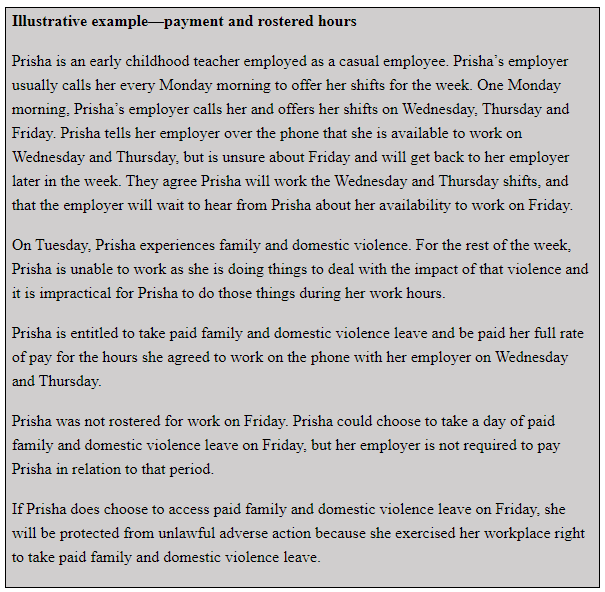Paid Family & Domestic Violence Leave
Key Takeaways
The proposed legislation doubles the amount of family and domestic violence leave from five days to 10 days and ensures all employees, including casuals who have been rostered are paid an amount equal to what they would have earned had they worked instead of taking the leave.
The 10 days FDVL is available ‘up front’ and is accessible upon commencement of employment, and resets each year on the person’s work anniversary.
Paid FDVL will commence on 1 August 2023 for small businesses, and 1 February 2023 for all other businesses.
The current notice and evidence requirements remain unchanged. FDVL is not paid out on termination.
The Details
On 28 July 2022 the federal government introduced the Fair Work Amendment (Paid Family & Domestic Violence Leave) Bill into parliament.
Once passed by the government, the new laws will amend the National Employment Standards and would:
- provide for 10 days of paid family and domestic violence leave (FDVL) in a 12 month for all employees (ie. full time, part time and casual)
- provide for employees to access paid FDVL at their full rate of pay for the hours they would have worked had they not taken the leave, to minimise the financial impact of family and domestic violence
- extend the definition of family and domestic violence to include conduct of a current or former intimate partner of an employee, or a member of an employee’s household.
The new paid entitlement is scheduled to come into effect on 1 February 2023 for all businesses except small businesses. For small businesses (ie. those employing less than 15 employees) an additional transition period is provided, with the new laws taking effect on 1 August 2023.
Between 1 February 2023 and 31 July 2023, small business employees will continue to be able to access the existing NES entitlement to five days unpaid family and domestic violence leave.
The new entitlement would operate in much the same way as the existing unpaid family and domestic violence leave entitlement. An employee who is experiencing family and domestic violence would be able to take the leave if they needed to do something to deal with the impact of family and domestic violence and it was impractical to do that thing outside their work hours.
The new entitlement also extending the definition of family and domestic violence to include conduct of a current or former intimate partner of an employee, or a member of an employee’s household. Unlike the Fair Work Commission’s May 2022 decision, the proposed laws extend the full entitlement to paid family and domestic violence leave to all employees, including casuals.
As described in the Explanatory Memorandum, these amendments to the NES are designed to support and assist employees affected by family and domestic violence to be paid and remain in continuous employment which provides financial security, independence, social networks and support, and increased self-esteem.
Does FDVL accrue or is it a lump sum entitlement?
Employees will gain the full benefit of the 10 days of paid FDVL on their first day of employment. The entitlement then resets on the day of the anniversary of when an employee’s employment started for each year they are employed with the same employer.
Payment for paid FDVL
The new section will entitle permanent staff (ie. full time and part time) who take FDVL to be paid at the employee’s full rate of pay worked out as if the employee had not taken the period of leave.
For a casual employee who takes a period of FDVL they are entitled to be paid at their full rate of pay for the hours they would have worked or was rostered to work in that period.
“Full rate of pay” includes incentive-based payments and bonuses, loadings, monetary allowances, overtime or penalty rates and any other separately identifiable amounts that they would have received had they been able to attend work instead of taking FDVL. The intention is that employees taking paid family and domestic violence leave will receive the same remuneration they would have received had they not taken the leave, as far as possible.
The Explanatory Memorandum provides the following illustrative example about payment and rostered hours for a casual employee.

When can FDVL be taken?
Regardless of whether an employee is accessing unpaid or paid FDVL (once it takes effect), employees can take the leave if they need to do something to deal with the impact of family and domestic violence and it’s impractical to do so outside their ordinary hours of work.
For example, this could include making arrangements for their safety, or safety of a close relative (including relocation); attending court hearings, or accessing police services.
The leave doesn’t need to be taken all at once and can be taken as single or multiple days. Where an employee has exhausted their entitlement to FDVL but still requires time away from work to deal with what’s happening they can access other paid leave such as annual leave, personal / carer’s leave or unpaid leave.
Notice & Evidence
If an employee takes family and domestic violence leave, they have to let their employer know as soon as possible. This can happen after the leave has started. Employees also need to tell their employer how long they expect the leave to last.
Employers can ask for evidence that shows the employee took the leave to deal with family and domestic violence. The evidence has to convince a reasonable person that the employee took the leave to deal with the impact of family and domestic violence. Types of evidence can include documents issued by the policy or court; family violence support service documents or statutory declaration.
Employers can ask employees to provide evidence for as little as 1 day or less off work. If the employee doesn’t provide the requested evidence, they may not get family and domestic violence leave.
Confidentiality
Being in health means we’re familiar with keeping personal and medical information confidential. When dealing with FDVL it is imperative that employers and managers take reasonably practicable steps to keep any information about an employee’s situation confidential when they receive it as part of an application for leave.
Support Services
If you, or someone you know is impacted by family and domestic violence, reach out to the 1800 RESPECT website or call 1800 737 732, the national sexual assault, domestic and family violence counselling service.
Do you have a FDVL Policy or Questions?
HIES will be updating its Leave Policy to reflect the FDVL changes. We will let members know when this document is ready to be accessed on our new look website – www.healthindustryes.com.au.
In the meantime, please reach out to HIES with any questions.
07 3386 6488



